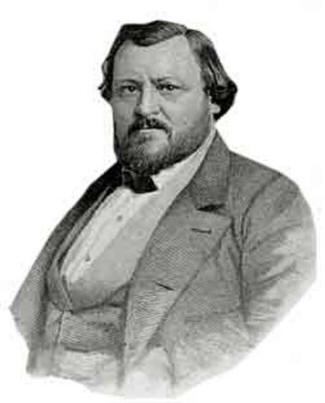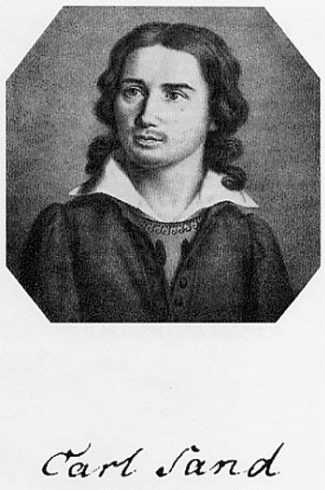Karl Ernst Jarcke
Carl Ernst Jarcke ( born November 10, 1801 in Gdansk, † December 27, 1852 in Vienna ) was a lawyer and political publicist.
Biography
Jarcke was born in Danzig, the only son of a merchant and grew up in the true parent, but rationalistic world of the bourgeoisie in Gdansk. He attended public school and also the Latin Oberpfarr school before he began an apprenticeship at 14. 1817 to 1819 he attended, as did not satisfy him, the merchant profession, the gymnasium. In 1819 he attended the University of Bonn on the study of law, but also heard lectures on history and philosophy. In 1819 he became a member of the Old Bonner fraternity / community. 1821 moved Jarcke to the University of Göttingen, where he was brought up mainly by Gustav von Hugo to the historical school of law. In 1822, he wrote in the tradition of this school of law his dissertation Roman criminal law, with whom he habilitated at the University of Bonn. At the University of Bonn, he was also active as a lecturer. In 1824 he was appointed extraordinary professor. As with the extraordinary professorship was associated with no regular income, Jarcke was in addition to his work at the University of Bonn and Cologne judge in town.
Conversion to Catholicism
Jarcke arrived in time in Cologne and Bonn with the Catholic circle of scholars around Karl J. Windischman in contact. Windischman confronted the time of its emergence within the Catholic Church modernist and rationalist tendencies. In 1825, he joined then converted to the Catholic faith. The turn to Catholicism made later noticeable in his work. So he took in his three-volume, 1827-1830, published " Manual of the common German criminal law " that the Christian Catholic doctrine is the basis of social coexistence. He therefore put the section on " crimes against God and religion " in the first place.
Activities in Berlin
Also in 1825 he was appointed to the University of Berlin as an associate professor of criminal law. There he met, among others, the founder of the historical school of law Savigny and the philosopher Hegel know. In Berlin Jarcke was also appointed to the Commission on the revision of the Prussian law, where he edited the sections on church, religion, marriage and morality.
Through the July Revolution in France in 1830 Jarcke was animatedly politics turn. In 1831 he anonymously published " The French Revolution of 1830 ." In this writing, he took the view that the revolution reversing the divine legitimate and historically grown order that threatens Europe as a whole. The study " K. L. Sand and be perpetrated in Kotzebue murder. A psychologically - criminalistische discussion of the business. our time, " he ruled on the directed against the restoration policy after the liberation wars German national movement. He assumed that this revolutionary movement therefore equate also the political assassination as a means and an end, and be with the danger of revolution. With the views expressed in these publications thought he caught the attention of the Prussian Conservatives to Ernst Ludwig von Gerlach. With representatives of this direction Carl Ernst Jarcke founded the "Berlin Political weekly paper ", which appeared on the October 8, 1831. Jarcke recorded as the first editor of the publication. The purpose of the magazine was the idea of fighting with the revolutionary and national movement. The magazine was the leading organ of aimed at the restoration of the Christian state -hards. 1837 Jarcke should give up his employees in connection with the dispute over the cologne mixed marriages, since the other editors to beat on the Protestant side, but he represented the Catholic line.
Activities in Austria
1832 Jarcke was appointed to operate Prince Metternich to the imperial- royal council and publicists of the State. He then moved to Vienna. There he worked for Metternich press and also for the censorship office. In the censorship he fought liberal- religious writings and also the publications of the boys Deutschlandes. Since it was after the end of his participation in the "Berliner political weekly " believes that true conservatism only on the basis of Catholic doctrine was possible, he founded together with Gorres 1838 in Munich, the historical- political music for Catholic Germany, the should be during the 19th century the leading organ of Catholicism in Germany. In addition to his journalistic activity Jarcke was also active as a diplomat in church affairs. So he negotiated on behalf of the Austro-Hungarian State Chancellery 1840 in Rome in matters of Hungarian mixed marriages. He sat in church politics for the freedom of the Catholic Church of the Limitations of the Josephinism. In this context, he encouraged the poet Joseph von Eichendorff in his 1847 published literature to write from a Catholic perspective.
When Metternich government was overthrown in the wake of the Revolution of 1848/1849, Jarcke was on leave. He retired then back to Munich. After the Revolution he moved in 1850 to Vienna, where - which was due in part to his efforts - on 19 April 1850, the government restriction of the church had been repealed by the Josephinism. After a long illness he died in 1852 in Vienna. He is buried in the cemetery to Mary Grossenzersdorf in the mountains near Vienna.
Works
Handbook of common German criminal law. Nachdr the Ed Berlin, Dümmler, 1827-1830 Keip, Goldbach 1996, ISBN 3-8051-0285-2










